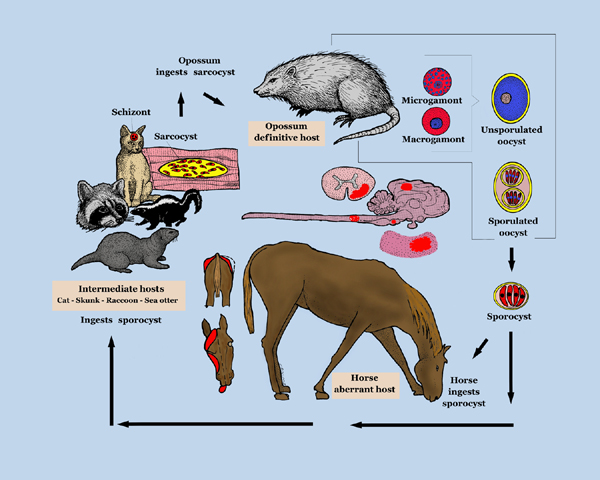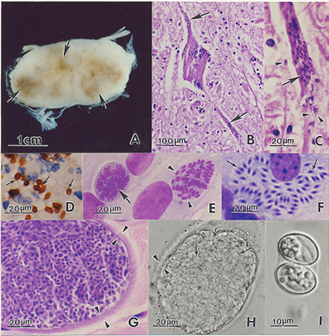Difference between revisions of "Equine Protozoal Myeloencephalitis"
| Line 2: | Line 2: | ||
====Description==== | ====Description==== | ||
| − | A progressive, infectious (Pasq) neurological disease of horses, endemic in the USA (EPM8) and only encountered elsewhere in imported equids (EPM 3). EPM is one of the most frequently diagnosed neurological conditions of the Western Hemisphere (Furr) and the principal differential for multifocal, asymmetric progressive CNS disease (Pasq). As it can resemble any neurological disorder, EPM must be considered in any horse with neurological signs if it resides in the Americas or if it has been imported from that area (EPM 8, 9). The disease is not contagious (Pasq). | + | A progressive, infectious (Pasq) neurological disease of horses, endemic in the USA (EPM8) and only encountered elsewhere in imported equids (EPM 3). EPM is one of the most frequently diagnosed neurological conditions of the Western Hemisphere (Furr) and the principal differential for multifocal, asymmetric progressive central nervous system (CNS) disease (Pasq). As it can resemble any neurological disorder, EPM must be considered in any horse with neurological signs if it resides in the Americas or if it has been imported from that area (EPM 8, 9). The disease is not contagious (Pasq). |
====Aetiology==== | ====Aetiology==== | ||
| − | EPM results from infection of the CNS by the apicomplexan parasite ''Sarcocystis neurona'' or, less frequently its close relative | + | EPM results from infection of the CNS by the apicomplexan parasite ''Sarcocystis neurona'' or, less frequently, its close relative ''Neospora hughesi'' (Mayhew and others 1976, Marsh and others 1996, Dubey and others 2001a).(EPM6, Wobeser 2009). These protozoans develop within neurons (Furr) causing immediate or inflammatory-mediated neuronal damage (Vetstream). The organisms migrate randomly through the brain and spinal cord causing asymmetrical lesions of the grey and white matter and thus multifocal lower and upper motor neuron deficits (Pasq). |
Revision as of 14:48, 16 July 2010
| This article is still under construction. |
Description
A progressive, infectious (Pasq) neurological disease of horses, endemic in the USA (EPM8) and only encountered elsewhere in imported equids (EPM 3). EPM is one of the most frequently diagnosed neurological conditions of the Western Hemisphere (Furr) and the principal differential for multifocal, asymmetric progressive central nervous system (CNS) disease (Pasq). As it can resemble any neurological disorder, EPM must be considered in any horse with neurological signs if it resides in the Americas or if it has been imported from that area (EPM 8, 9). The disease is not contagious (Pasq).
Aetiology
EPM results from infection of the CNS by the apicomplexan parasite Sarcocystis neurona or, less frequently, its close relative Neospora hughesi (Mayhew and others 1976, Marsh and others 1996, Dubey and others 2001a).(EPM6, Wobeser 2009). These protozoans develop within neurons (Furr) causing immediate or inflammatory-mediated neuronal damage (Vetstream). The organisms migrate randomly through the brain and spinal cord causing asymmetrical lesions of the grey and white matter and thus multifocal lower and upper motor neuron deficits (Pasq).

